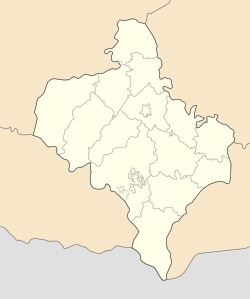Vorokhta
|
Vorokhta Ворохта |
|||
|---|---|---|---|

Vorokhta landscape
|
|||
|
|||
| Vorokhta in Ivano-Frankivsk Oblast | |||
| Coordinates: 48°16′57″N 24°33′46″E / 48.28250°N 24.56278°ECoordinates: 48°16′57″N 24°33′46″E / 48.28250°N 24.56278°E | |||
|
Country Oblast Raion |
Ivano-Frankivsk Oblast Yaremche / Municipality |
||
| Named Vorokhta | 1598 | ||
| Government | |||
| • Head of council | Petro Kermoshchuk | ||
| Area | |||
| • Total | 15 km2 (6 sq mi) | ||
| Elevation | 850 m (2,790 ft) | ||
| Population (2016) | |||
| • Total | 4,270 | ||
| Website | vorokhta.org | ||
Vorokhta (Ukrainian: Ворохта, Polish: Worochta) is an urban-type settlement located in the Carpathian Mountains and is part of Yaremche Municipality. Historically, it is a tourist spa town and later was also turned into a ski resort with several ski-jumping ramps (Avanhard). Population: 4,270 (2016 est.); due to a constant flow of tourists, its population almost year round is bigger.
Located at an elevation of 800 metres above sea level, it is known for its close ties to the Hutsuls - an ethno-cultural group of Ukrainians who live in the Carpathians, and is often regarded as a Hutsul capital.
Vorokhta along with the town of Yaremche and few more villages constitute a series of enclaves within the Nadvirna Raion and administered by the Yaremche city municipality. Nadvirna Raion was renamed from the Nadworna County, Stanislawow Voivodeship that existed prior to the Soviet invasion of Poland in 1939. The town is located near the administrative border with Zakarpattia Oblast in the close to the Yablunytsia Pass and source of Prut River. Vorokhta is surrounded by the Carpathian National Nature Park and the ethographic area of Hutsuls. The town is surrounded by such mount peaks as Mahora, Makivka, and others.
The area of Vorokhta (Worochta in Polish) was in the mid-14th century annexed by the Kingdom of Poland, and remained in Poland until 1772 (see Partitions of Poland). From 1772 to 1918, it belonged to Austrian Galicia, and after World War I, the town returned to Poland. In 1928, the government of the Second Polish Republic named it a spa. In the interwar period, Vorokhta/Worochta was part of Nadworna County, Stanisławów Voivodeship. Until July 1939, the town was a garrison of Worochta Battalion of the Border Protection Corps. At that time, Vorokhta was a popular tourist spa. Here, Polish Prime Minister Kazimierz Bartel had a villa, here stayed popular poet Jerzy Liebert, who suffered from tuberculosis.
...
Wikipedia



